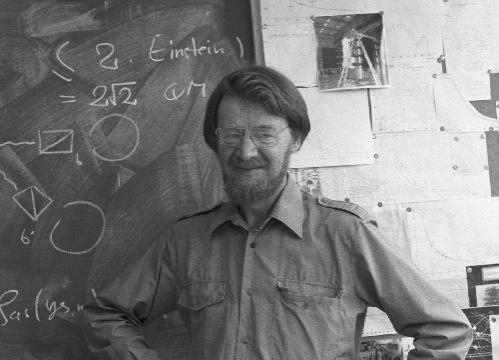 In honour of the 60th anniversary of John Stewart Bell's groundbreaking work on Bell's Inequality, quantum computing startup and UCD spinout Equal1 is launching an inaugural ‘Quantum Solutions for the Environment Challenge’ and invites students across the island of Ireland to explore the transformative potential of quantum technologies to address environmental challenges.
In honour of the 60th anniversary of John Stewart Bell's groundbreaking work on Bell's Inequality, quantum computing startup and UCD spinout Equal1 is launching an inaugural ‘Quantum Solutions for the Environment Challenge’ and invites students across the island of Ireland to explore the transformative potential of quantum technologies to address environmental challenges.
As a tribute to Bell, a Belfast-born physicist whose work fundamentally reshaped our understanding of quantum mechanics, the challenge aims to inspire the next generation of Irish scientists, engineers, and software developers to build on his legacy.
Third-level students from any science, engineering, or software course are invited to investigate how quantum principles can be applied to benefit the environment. From optimising renewable energy systems to innovating sustainable materials and conservation solutions, students may explore how quantum science can address pressing environmental issues.
College Principal of UCD College of Science, Professor Jeremy Simpson said: “As we celebrate the 60th anniversary of Bell’s Inequality, we're excited to partner with Equal1, Ireland’s only quantum computing startup, and a UCD spinout, on this inaugural Quantum Solutions for the Environment Challenge. John Bell's work challenges us to push the boundaries of what’s possible in quantum mechanics. We would encourage UCD students to work with our Centre for Quantum Engineering, Science, and Technology (C-QuEST) to take this unique opportunity to connect Bell’s work to practical applications, as we seek to encourage a new generation of innovators as they develop quantum-inspired solutions to complex environmental issues.”
Elena Blokhina, Chief Scientific Officer, Equal1 and Associate Professor, UCD School of Electrical and Electronic Engineering said: “Ensuring our emerging quantum industry has a talent pipeline of the best minds working on commercialising quantum is major challenge. Equal1 is inspired by the fact that a quantum physicist born in Belfast had such an impact and we hope that this competition might inspire the next generation of scientists to drive the quantum industry forward.”
Why Bell’s Legacy Matters Today
Bell’s 1964 paper on quantum entanglement and Bell's Inequality became a foundation for quantum science, which has since led to the development of quantum computing and quantum technologies with vast potential to shape our future. As we mark the 60th anniversary of this iconic breakthrough, students will have a unique opportunity to connect Bell’s theoretical work to practical applications, demonstrating how quantum science can address global environmental challenges.
Guidelines
Select an environmental issue: Choose a specific environmental issue that can benefit from quantum applications. Examples include quantum simulations for climate modeling, using quantum algorithms for optimising renewable energy systems, or exploring quantum chemistry for sustainable material design.
Demonstrate quantum potential: Describe how quantum technologies could address the issue, either by reducing environmental impact, enhancing existing processes, or proposing a novel solution. This can be theoretical or simulated, demonstrating an understanding of quantum principles.
Showcase practical benefits: Explain the potential benefits and impacts on the environment, outlining a roadmap to bring the concept closer to real-world application.
Eligibility
Open to all third-level students on the island of Ireland enrolled in any third-level STEM course. Teams may consist of up to four members. Further details will be available on 20 November via Equal1’s website.
Awards
Winning teams will receive cash prizes, with a total of €10,000 across teams and individuals. This cash award is made possible due to Equal1’s success in the Institute of Physics qBIG prize earlier in 2024. As well as cash prizes, the winners will receive mentorship opportunities with leaders in quantum and environmental science, and a chance to present their solutions at a symposium dedicated to Bell’s anniversary. Top projects may be featured in both quantum an environmental publications.
Judging Criteria
Projects will be assessed on:
- Innovation: Originality of the idea and application of quantum concepts.
- Environmental Impact: Potential to positively impact environmental challenges.
- Feasibility: Practicality and clarity in explaining how the solution could be implemented.
- Presentation: Clarity, organization, and effectiveness in communicating ideas.
Celebrate John Stewart Bell’s transformative contributions to science and join the ‘Quantum Solutions for the Environment Challenge’ to continue his legacy by shaping a sustainable future through quantum innovation!